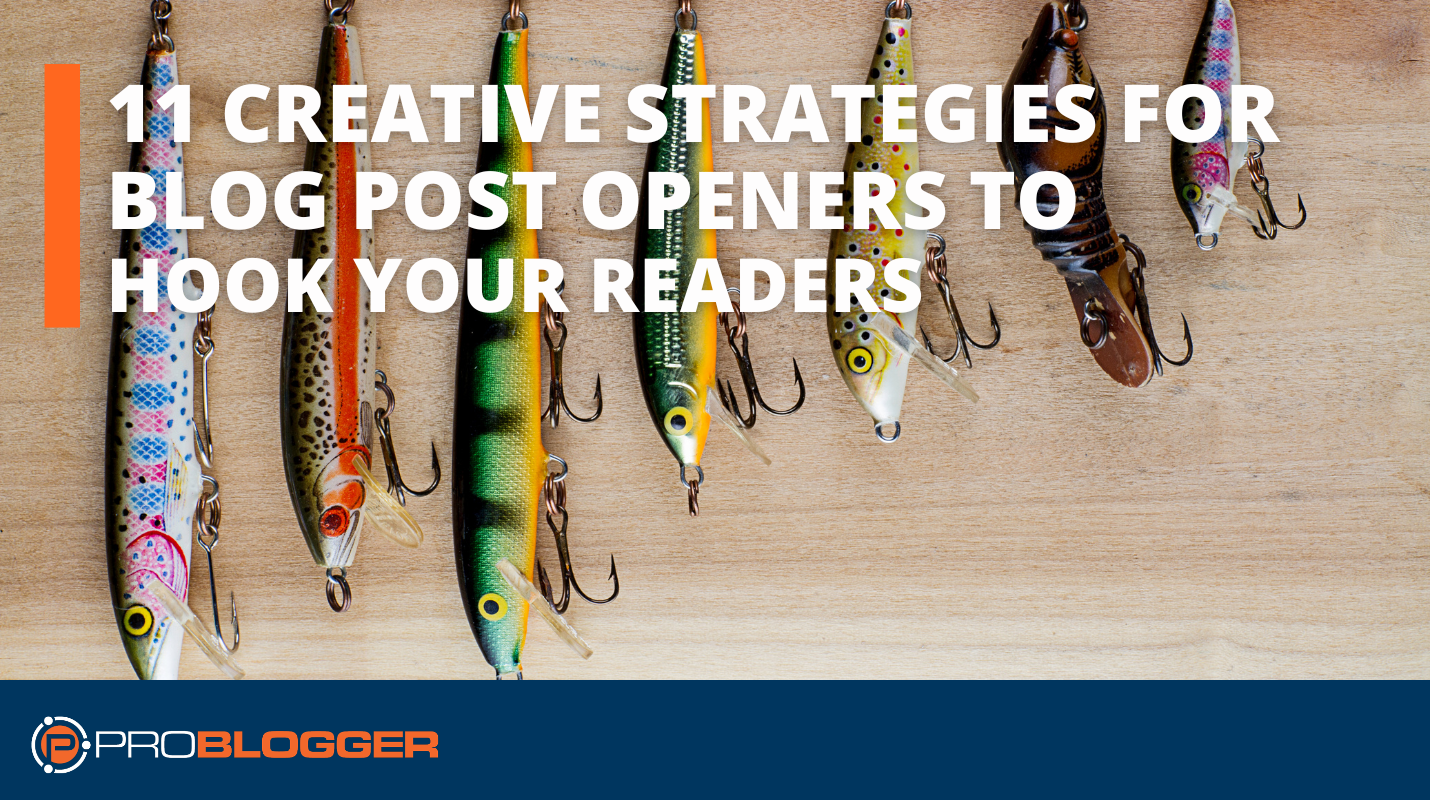

Titles change the destiny of your posts.
Those few words at the beginning of your blog post can be the difference between the post being read and spread like a virus through the web like a wild fire and it languishing in your archives, barely noticed.
This month we’ve been talking about how to ‘craft’ blog posts and are looking at key moments in the writing of blog posts that it is important to pause and put a little extra effort into.
While there will usually only be a handful of words in your post title – they are the most powerful words that you’ll write because for most of your readers the decision as to whether to read the rest of your post rests upon them.
Why Blog Post Titles Matter
Blog post titles appear in:
- Search engine results
- RSS feeds
- Links from other bloggers
- Social media sites
- On your archive pages (depending upon how you format them)
In each of these occassions the title can be the only thing that people see and the sole thing that people make the decision to visit your post on. Write a boring, complicated or confusing title and it doesn’t matter what you’ve written in the post – very few people will ever read it.
What should a Good Blog Post Title Do?
There are many techniques that copywriters use in crafting titles or headings both online and offline – but there’s generally one common goal behind them all. It can be summed up in the words of David Ogilvy who in Ogilvy on Advertising (a great copywriting book) again and again echoes the refrain that:
“the purpose of a title is to get potential readers to read the first line of your content.”
This is one of the lessons that has helped me the most in my own blogging and I’ve seen it’s power again and again.
Write a captivating and intruiging title and you’ll draw people into reading it every time.
How to Craft a Blog Post Title – 8 Tips

 How do you craft a blog post title that get people to read your blog posts opening lines?
How do you craft a blog post title that get people to read your blog posts opening lines?
There are many techniques for crafting blog post titles that will draw readers into them. Below I’ll outline a few (you won’t be able to do all of them in every single post).
Before I share them – let me give one universal tip – Don’t Rush – this is the main point of this whole series on crafting content. If there’s nothing else you come away from today – take away that if you rush your titles you could well be wasting the time that you invest into your actual posts. Invest time into your posts, it’s something that will pay off!
Now that we’re taking our time – here are 8 tips that I use in the creation of blog post titles. Note: you’d not be likely to use all of them in the one post (although for fun I did my best to get quite a few of them into the image title above). Different techniques will work better in different situations.
1. Communicate a Benefit
This is SO IMPORTANT. If a potential reader comes across your post in Google search results or your RSS feed or on a site like Digg and they see a title that promises to meet a need they have – they’ll click that link on almost every occassion. Identify a need in of potential readers (we talked about this in yesterdays post) and communicate that your post will solve this problem or need in your title. This is why posts with titles like ‘How to Hold a Digital Camera’ and ’10 Ways to Take Stunning Portraits’ (LINKSSSSSSS) have driven hundreds of thousands of readers to my photography blog in the last year. They are not ‘clever’ or ‘cryptic’ titles – they simply SCREAM at those that see them what they’ll get if they visit the post. These titles don’t draw everyone that see’s them to them, but they’ll certainly draw in people with the needs that you’re aiming the post at.
2. Create Controversy or Debate
Another technique that can be very good at drawing people into a post is to set the scene for controversy, debate or a strong opinion. You need to be willing to back these types of titles up with posts that reflect the title – but controversy is one of those things that tends to pique people’s interest. Keep in mind that when you create controversy you’ll attract strong reactions in people.
3. Ask a Question
When you ask a question those who read it are wired to respond (or to see what the response is). I find that questions at post titles can be very popular at not only drawing in readers – but particularly effective at getting readers to leave comments – particularly if the comment directs a question AT the reader (ie use the word YOU in the question) rather than just being a random question. I’ll write more on personalizing titles below.
4. Personalize Titles

 When you write blog posts you are potentially writing to vast audiences of many thousands of readers – however readers can feel like the post is laser targetted in on their own specific situation, particularly if you personalize the language that you’re using. One of the easiest ways to do this is simply to use the word ‘you’ in your posts. I wrote a little about this in First Person Blogging about ‘You’ but mainly talked about using the word ‘you’ in the post itself but in the title of your posts it can have an even bigger impact. Example – 21 Ways to Make Your Blog or Website Sticky.
When you write blog posts you are potentially writing to vast audiences of many thousands of readers – however readers can feel like the post is laser targetted in on their own specific situation, particularly if you personalize the language that you’re using. One of the easiest ways to do this is simply to use the word ‘you’ in your posts. I wrote a little about this in First Person Blogging about ‘You’ but mainly talked about using the word ‘you’ in the post itself but in the title of your posts it can have an even bigger impact. Example – 21 Ways to Make Your Blog or Website Sticky.
5. Use Keywords
Keywords in titles are good for two main reasons:
- Firstly they grab the attention of readers who are scanning content – I noticed this recently when I was in a buying mode looking to get an iPhone. Anytime any post in my RSS feeder had the word ‘iPhone’ it was like a flashing light and attracted my attention to it. I could hardly help it but because I was on the look out for information to help me with that purchase the keyword was a great attention grabber.
- Secondly – keywords are important for the long tail life of your blog post as they tell search engines what your blog post is about and will help it to rank highly for those words. Search engines pay particular attention to titles to assertain what a web page is about – particularly if you use the words in your page ‘title tags’ as well (read more on title tags and SEO).
So use keywords that relate to your post in your titles. This is a particularly useful tip if you write about products, people or companies as these types of ‘names’ are some of the most searched for terms on the web.
One more tip for keywords – if you can include them at the start of your title they can have more impact with SEO than if you include them at the end of a title (particularly if the title is long).
6. Use Power Words
Not all words are created equal – some evoke a powerful response in readers and it can be well worth your while to find out what they are.
It’s difficult to compile a list of these ‘power words’ but a few that I’ve found that can work (although read my disclaimer below):
- Free – there’s something about the idea of getting something for nothing that triggers a response in most of us.
- Stunning – I use words like ‘stunning’ on my photography blog a lot. These words are ‘big claim’ words that draw people into the post to see if it matches up (see below for more on ‘big claims’)
- Discover – everyone likes to make discoveries. Another ther related word is ‘revealed’.
- Secrets – this triggers a response because it promises to show you something you don’t yet know. Similarly – you could use ‘Little Known Ways to…’ as an alternative to ‘secrets’.
- Easy – similarly to ‘free’ – we all like ‘easy’ don’t we? – also use ‘quick’. Better still – what about ‘quick and easy’?
Disclaimer – power words can be very beneficial, however they can also trigger negative reactions. Some people get skeptical when they see titles with these types of words and will resist clicking them – others will click them but get angry if the post itself doesn’t live up to the title. Proceed with caution.
7. Big Claims and Promises
I’ve mentioned this technique already but it does deserve a little further exploration as it is a definite way to draw people into a post. Making a bit claim or promise really extends upon my first technique – ‘Communicate a Benefit’ – but takes it to a place where the benefit being shared in the title just cannot be ignored.
These sorts of ‘big claims’ make guarantees that even people without a real need in your topic will want to check out.
The only problem with big claim posts is that if you can’t actually back them up with the post itself, you run the risk of putting readers offside.
8. Humor Titles

 The humorous title is yet another technique that can be very effective at drawing readers into you blog – that is IF you pull it off.
The humorous title is yet another technique that can be very effective at drawing readers into you blog – that is IF you pull it off.
The risk with humorous posts is that they can also fall flat on their faces and leave you with a post title that not only fails to draw loyal readers in but which is not optimized well for search engines (unless you manage to incorporate some keywords).
Two More Quick Tips on Writing Blog Posts:
Keep it short – while it is possible to actually grab people’s attention with a very long title (the length itself can draw people to it) – in most cases you’ll want to keep it simple and easy to digest. This is good for readers but also search engines (they will only show 65 or so characters so if you go too long your full title doesn’t appear in search results).
Don’t use Periods (full stops) – this one might just be my personal preference and open for debate (although I’ve seen a number of copywriters talk about it) but using full stops or ‘periods’ at the end of titles can stop the flow of your readers. It’s not a big one but something that could have an impact.
Further Reader on Blog Post Titles:
- Andy Beal wrote a thought provoking post – How to Optimize Blog Post Titles – in which he explores two audiences of blog posts and how he suggests you optimize titles for each at different life stages of a post.
- Brian Clark has written some fantastics posts on Blog Post Titles in his series Magnetic Headlines. It includes some title templates that are worth experimenting with.
- Coschedule – a tool we use for scheduling blog posts and social media – also has a very handy Headline Analyzer free tool which gives you feedback to help you improve your titles.
What have you learned about writing blog post titles? Do you use some of the above approaches or have you found other techniques to work for you?
Read the Full Series
This post is part of a series on how to craft blog posts. It will be all the more powerful if taken in context of the full series which looks at 10 points in the posting process to pause and put extra effort. Start reading this series here.










